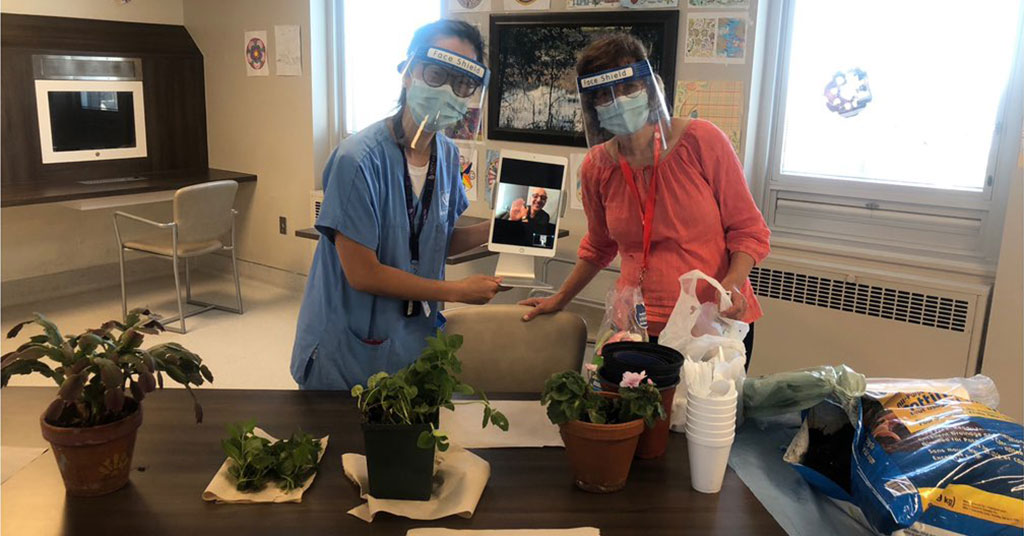Ten great things that happened this week

(September 3, 2020) – Living and working through COVID-19 is tough, but that doesn’t mean we can’t celebrate the wonderful things that are happening at our sites – and for our people – along the way.
Each week, we’re sharing a list of 10 great things that happened this week. Do you have a story you’d like to share? Send it to communications@unityhealth.to.
1) International trials find that a class of drug reduces the risk of death for critically ill COVID-19 patients
An inexpensive, widely available class of drug called corticosteroids reduces the risk of death among critically ill COVID-19 patients, an analysis of seven trials published this week in the Journal of the American Medical Association (JAMA) has found. The seven international trials were coordinated by the WHO and included analyses by St. Michael’s Hospital researchers Drs. John Marshall and Arthur S. Slutsky. The WHO is updating its COVID-19 treatment guidance as a result of the research. Read more about it in The Globe and Mail.
2) How will the first wave help prepare us for the next one?
What will the second wave be like? Many of us are asking this question as the cooler weather draws us indoors, and the network prepares for a possible uptick in COVID-19 cases amidst our annual flu season. In a CEO column in Hospital News, Dr. Tim Rutledge explains how lessons learned from the first wave are guiding us as we prepare for what comes next. Read the CEO column.
3) The Globe and Mail publishes opinion piece by Dr. Sean Rourke on the importance of HIV self-testing kits
Dr. Sean Rourke says self-testing kits for HIV, which will soon be approved by Health Canada with the help of his research, can end the HIV crisis. “As is the case with COVID-19, we cannot leave it up to chance that people will get connected to care. Everyone must have access, regardless of social position, race, sexual orientation, economic status or geography,” said Dr. Rourke, scientist at the MAP Centre for Urban Health Solutions at St. Michael’s, wrote in his piece with co-author Bill Flanagan. Read the full column.
4) Why are female doctors still paid less than their male counterparts? Our experts weigh in
There is a big gender-based pay gap in medicine, according to new research published in the CMAJ and co-authored by Dr. Tara Kiran, Family Physician at St. Michael’s. Her study found that female doctors are underrepresented in the top-earning medical specialties such as radiology and cardiology. She also found that as the proportion of female doctors in a specialty grows, the income provided for that specialty declines. Dr. Kiran attributes this to systemic biases that pervade in the profession and that begin as early as medical school, and continue with hiring practices and in the workplace. Listen to her interview on the Bill Kelly Show.
5) Haven’t decided on whether to send your kids back to school? St. Joseph’s Foundation invited you to hear our experts
For parents weighing whether to send their children back to school, the St. Joseph’s Health Centre Foundation hosted a virtual town hall to help them make an informed decision. The session, which was open to the public and to staff, featured a discussion with St. Joseph’s Pediatricians Dr. Justine Cohen-Silver and Dr. Sloane Freeman, and Infectious Disease Physician Dr. Kevin Schwarz. It can be viewed here.
6) We spotlight our Energy Team whose bottom line is reducing energy use
They retrofitted the network with LED lights and they started an information campaign that successfully curbed the energy drain caused by too many hospital staff leaving their computers on after work. Our newly formed Energy Team, created by Katelyn Poyntz, Manager of Engineering, is always identifying and tackling energy-savings opportunities to improve the network’s sustainability.
7) St. Joseph’s staff find creative ways to bring therapy to mental health inpatients
Helping mental health inpatients connect and engage with others is important for their well-being during their stay at St. Joseph’s. Occupational Therapist Eunice Kim and Psychiatrist Dr. Kasra Khorasini have used a donated iPad to run virtual group therapy sessions and organize recreational activities for inpatients, including gardening and art.
8) St. Michael’s recruits a new scientist whose lung cancer research has personal significance
After she lost a teacher and both grandparents to cancer, Dr. Kelsie Thu focused her research on lung cancer. Specifically, she is working to identify the genetic reasons for why lung cancer therapies work in some patients but not in others, and to figure out how to improve their efficacy.
9) Can children spread COVID-19? Our experts weigh in
Research shows children are as likely as adults to spread COVID-19, but they are more likely to be asymptomatic. Dr. Peter Jüni, Director of the Applied Health Research Centre at St. Michael’s, and the Scientific Director of the newly formed Science Advisory Table spoke to the CBC about the newest research on this area. He also weighed these findings against the importance of sending children back to school for their development, social interactions and academics. Listen to the interview with Dr. Jüni.
10) Can we eliminate COVID-19 in Canada? Our experts weigh in
Are we definitely headed for a second wave? Is it possible to eliminate COVID-19 from Canada instead? Dr. Irfan Dhalla, Vice-President of Physician Quality at Unity Health, discusses the specific methods that would help us eliminate COVID-19, with the caveat that it can’t be done quickly. Read more.
